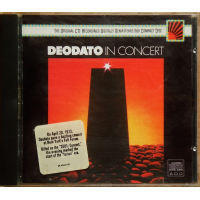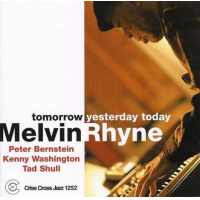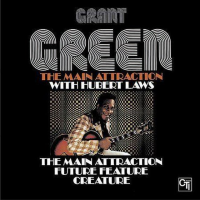Home » Jazz Articles » Liner Notes » Jun Iida: Evergreen
Jun Iida: Evergreen
Jun lida has called this place home for the past three years, another transient stop on his restless sojourn, but at a crucial time during which his path became ever-clearer. The trumpeter is leaving this beautiful place for the Mecca to where many musicians not long after the dawn of jazz have made their pilgrimage. New York beckons, but not before lida memorializes his time in Seattle with his first album, aptly naming it Evergreen.
lida's journey begins in St. Louis, born to a Japanese couple who had decided to make their own way to the United States. lida's father was in the steel industry, his career putting him and his family into the heartland of America—first to St. Louis, then along the rust belt to the Steel City itself, Pittsburgh. His mother was a Koto player and a semi-professional musician in Japan, and she shared the music she loved with her son, with her favorite recordings and her own singing. "Akatombo" is a well-known children's song he heard her sing, and his rendition of it on Evergreen pays tribute to her.
lida has a warm, inviting trumpet tone, an astute harmonic understanding and a sublime sense of melody, traits he shares with another native St. Louis trumpeter, one Miles Davis. Despite his love of Louis Armstrong and Duke Ellington, he thought of becoming a classical musician, if even that. He attended Case Western Reserve University in Ohio because of its ties to the famed Cleveland Institute of Music, but also for its engineering program. "I thought I had to make the choice of pursuing engineering or music," lida explains, hoping then to stave off that choice a little while longer. At Case, he met and studied with Paul Sequence Ferguson, a Cleveland-area trombonist and educator who sparked in lida for the first time a serious interest in jazz. lida obtained his engineering degree, but not before that spark would alight a fuse...
lida worked as an engineer in New Hampshire, Los Angeles, and Seattle, making musical friends everywhere he went. It was in Seattle that the fuse lit by his teacher Paul Ferguson would, years later, detonate an epiphany. Ferguson had done his graduate work at Eastman School of Music, at the same time that composer/bandleader Maria Schneider was there. Many years later, she brought her orchestra to Seattle, and lida went to see the show. "I just remember that was a wake-up call... such high-level music." At that moment, he knew what he needed to do. Soon after, lida left his day job to pursue music full-time.
For this album, lida brought Seattle drummer Xavier Lecouturier down to Los Angeles, and had vocalist Aubrey Johnson fly there from New York to record with three Southern California musicians: pianist Josh Nelson, guitarist Masami Kuroki and bassist Jonathan Richards. This is illustrative of lida's life and career—the musical friends he has made and kept in every city he has called home continue to shape and inspire who he is, and who he will be.
Similarly, the music he wrote and arranged for this album reflects on his evolution as a musician and person. They reveal lida's diverse jazz interests: fun, swinging tunes like "Gooey Butter Cake" and "Bellarosa," or more modern treatments such as the title track "Evergreen," the metrically-challenging "Forgotten Memories," and the contemporary-jazz vibe, "Holding On to Autumn." There are also moments of solace and unhurried beauty, contained in the two ballads "Theme from Spartacus," done exquisitely as a duo between Nelson and lida, and the dark evocation "Song for Luke."
In addition to "Akatombo," lida decided to record "Shiki no Uta," a J-pop anime song originally produced by Nujabes, the Japanese musician who pioneered a form of hip-hop called "lo-fi." lida's version infuses jazz into that J-pop/hip-hop hybrid, and he notes this intersection of genre and culture carries special meaning to him. "I think that's part of the beauty of this country, of different cultures coming together," he says, noting that it has not always been like that. "Growing up in Missouri as the only Asian kid in my classroom, where I was made to feel not as American... It's not a good feeling to be made to feel that you're not enough of something. The less we can make people feel that way, whether it's culturally speaking or whatever identity people hold, it's an opportunity to celebrate as opposed to divide." One of the most brutally divisive acts captured on video in this new millennium was the murder of George Floyd, a black man, by a white police officer in Minneapolis. "This happened in the period of time when I was writing a lot of this music," he explains. The piece "My Anguish in Solidarity" was his response to what had happened.
Thankfully, in lida's life there has been much more celebration than division, in all the places he has lived. "I've been extremely thankful for all the opportunities I've had," he notes. "I would like to keep continuing to grow and to be challenged and to keep improving, moving towards that end goal... it's been very comfortable here in Seattle, but l'm also a little bit excited to be a bit uncomfortable there in New York."
And so, Jun lida is moving again, releasing Evergreen as he releases the comfort of the Evergreen State. "It's the first time I'm kind of sharing my music with the greater audience, but you know, even my friends and family haven't really heard my music," he admits. "I had kind of this winding, twisting road to get to where I am, as a person and also musically, but I don't really think would change anything... I'm happy where I am now, and I'm just excited to share this music and, in a greater sense, my story."
Liner Notes copyright © 2026 Gary Fukushima.
Evergreen can be purchased here.
Contact Gary Fukushima at All About Jazz.
Gary Fukushima is a keyboardist and composer in Los Angeles, as well as a jazz journalist.
Track Listing
Gooey Butter Cake; Akatombo; Evergreen; Shiki no Uta; Bellarosa; Forgotten Memories; Love Theme from Spartacus; My Anguish in Solidarity; Song for Luke; Holding On to Autumn.
Personnel
Jun Iida
trumpetAubrey Johnson
vocalsMasami Kuroki
guitarJosh Nelson
pianoJonathan Richards
bassXavier Lecouturier
drumsAlbum information
Title: Evergreen | Year Released: 2023 | Record Label: OA2 Records
Tags
PREVIOUS / NEXT
Jun Iida Concerts
Support All About Jazz
 All About Jazz has been a pillar of jazz since 1995, championing it as an art form and, more importantly, supporting the musicians who make it. Our enduring commitment has made "AAJ" one of the most culturally important websites of its kind, read by hundreds of thousands of fans, musicians and industry figures every month.
All About Jazz has been a pillar of jazz since 1995, championing it as an art form and, more importantly, supporting the musicians who make it. Our enduring commitment has made "AAJ" one of the most culturally important websites of its kind, read by hundreds of thousands of fans, musicians and industry figures every month.
























